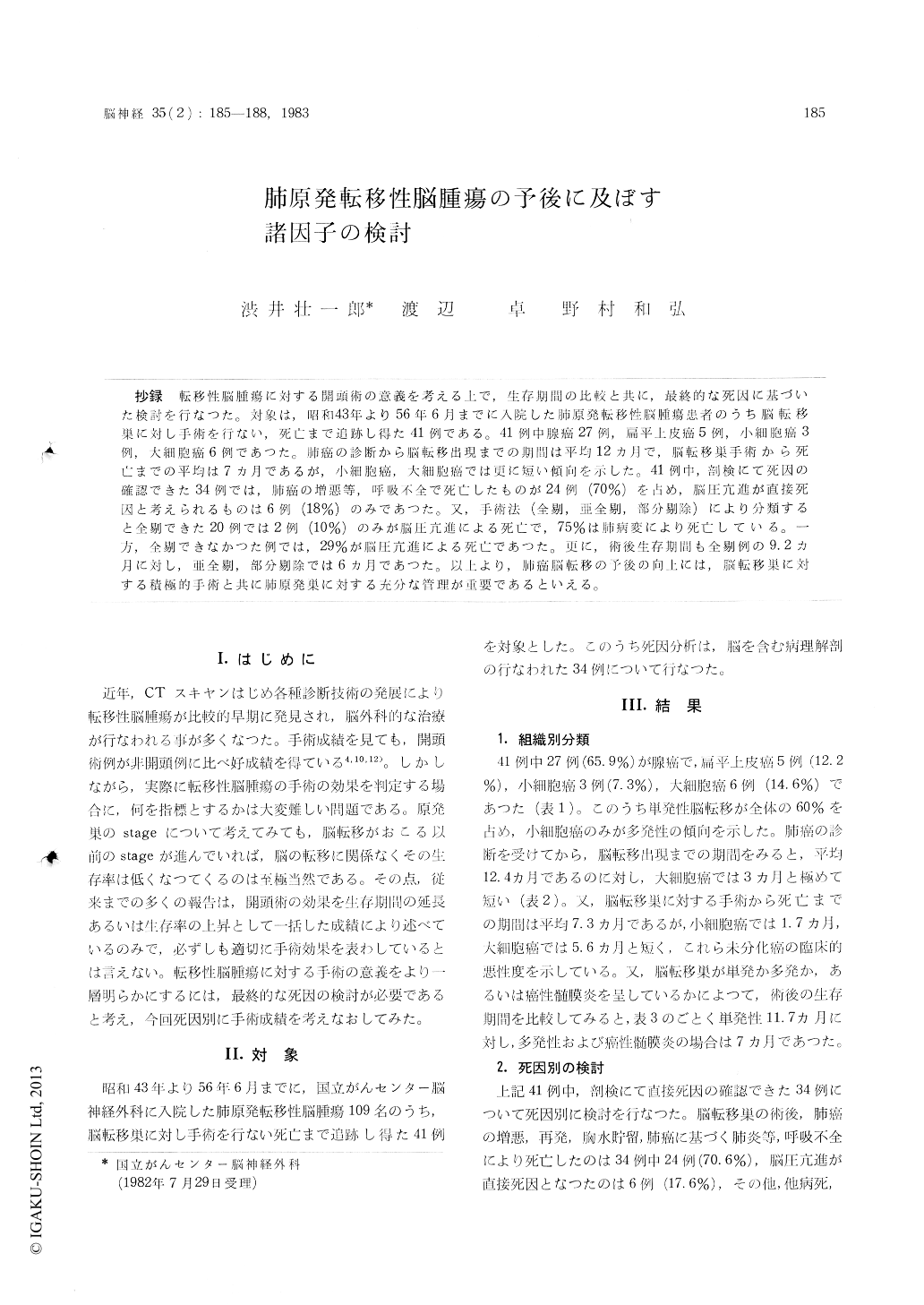Japanese
English
- 有料閲覧
- Abstract 文献概要
- 1ページ目 Look Inside
抄録 転移性脳腫瘍に対する開頭術の意義を考える上で,生存期間の比較と共に,最終的な死因に基づいた検討を行なつた。対象は,昭和43年より56年6月までに入院した肺原発転移性脳腫瘍患者のうち脳転移巣に対し手術を行ない,死亡まで追跡し得た41例である。41例中腺癌27例,扁平上皮癌5例,小細胞癌3例,大細胞癌6例であつた。肺癌の診断から脳転移出現までの期間は平均12ヵ月で,脳転移巣手術から死亡までの平均は7ヵ月であるが,小細胞癌,大細胞癌では更に短い傾向を示した。41例中,剖検にて死因の確認できた34例では,肺癌の増悪等,呼吸不全で死亡したものが24例(70%)を占め,脳圧亢進が直接死因と考えられるものは6例(18%)のみであつた。又,手術法(全剔,亜全剔,部分剔除)により分類すると全剔できた20例では2例(10%)のみが脳圧亢進による死亡で,75%は肺病変により死亡している。一方,全剔できなかつた例では,29%が脳圧亢進による死亡であつた。更に,術後生存期間も全剔例の9.2ヵ月に対し,亜全剔,部分剔除では6ヵ月であつた。以上より,肺癌脳転移の予後の向上には,脳転移巣に対する積極的手術と共に肺原発巣に対する充分な管理が重要であるといえる。
Forty-one patients with metastatic brain tumors from lung cancer were operated on at the Natio-nal Cancer Center Hospital during 1968 and 1980, and their causes of death were investigated. Of these patients, 27 (65. 9%) were adenocarcinomas, five (12.2%) squamous cell carcinomas, three (7. 3%) small cell carcinomas, and six (14. 6%) large cell carcinomas. Sixty percent were solitary me-tastases. The average time from the diagnosis of lung cancer to brain metastasis was twelve mon-ths, but in cases of large cell carcinomas it was only three months. The average survival time after the operation of brain metastasis was about seven months, while it was shorter in small cell carcinomas (1. 7 months) and large cell carcinomas (5. 6 months).
In 34 of these 41 patients. the direct causes of death were investigated and classified into three groups : 1 ) respiratory disorders due to aggrava-tion or recurrence of lung cancer ; 2) intracra-nial hypertension due to brain edema or the me-tastatic lesion itself ; 3) others, for example, gastro-intestinal bleeding, accidents, and so on. In this classification, only six of 34 died of intra-cranial hypertension. Twenty-four (70%) died of respiratory disorders and four died of other ca-uses.
These patients were also classified into three groups according to the operative procedures : 1 ) 20 cases of total removal of the metastatic brain lesions ; 2) seven cases of subtotal removal ; 3 ) seven cases of partial removal or decompressive craniectomy.
As already mentioned, six of 34 patients (18%) died of intracranial hypertension, but when the metastatic lesion was totally removed, only two of 20 (10%) died for this reason, while four of 14 (29%) died of intracranial hypertension when it was not totally removed. The average post-operative survival time was 9. 2 months and 6 months, respectively.
These data indicate that neurosurgical interven-tion should be done as much as possible, and if the metastatic brain tumor is successfully removed, most of the patients would not die of intracranial hypertension, but of respiratory disorders. The prognosis of patients with metastatic brain tumor from lung cancer will be improved if more effec-tive therapy for the primary lesion is deveolped.

Copyright © 1983, Igaku-Shoin Ltd. All rights reserved.


